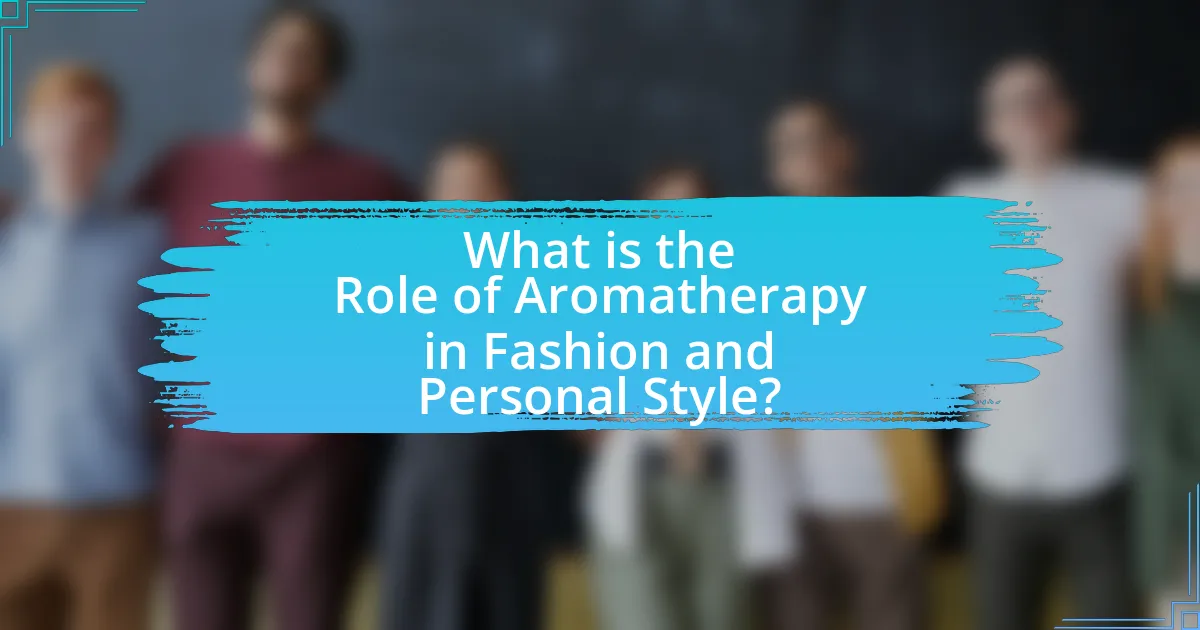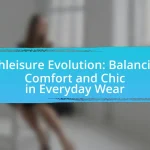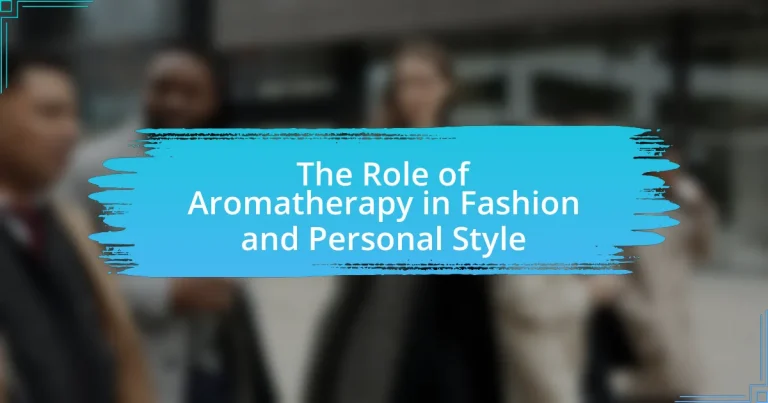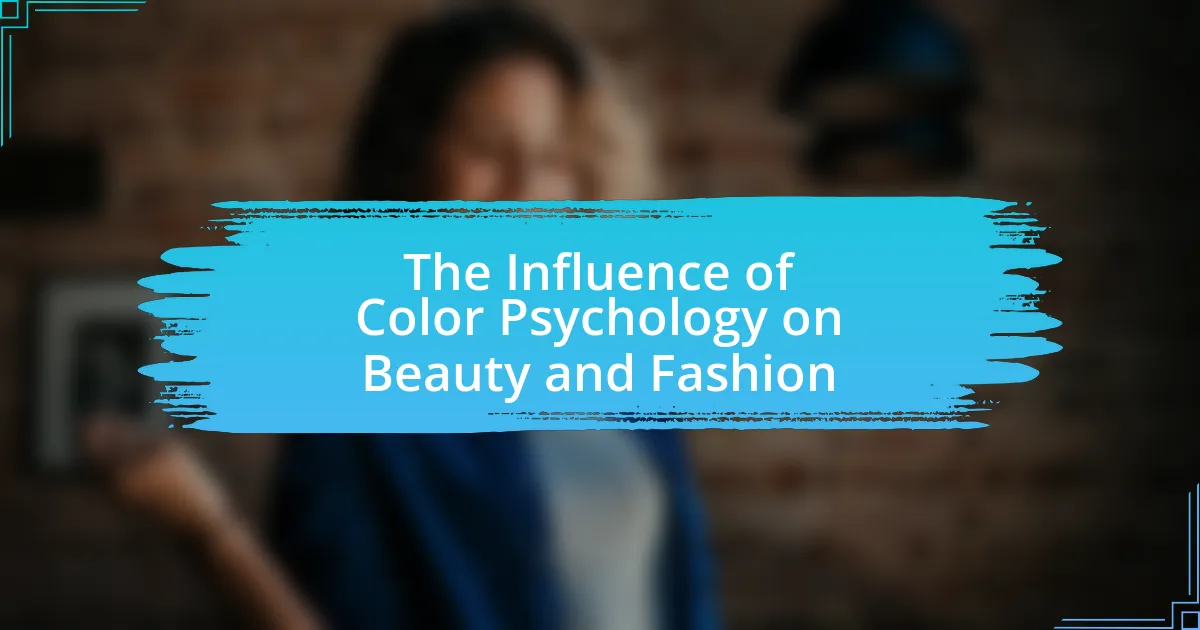Aromatherapy significantly influences fashion and personal style by enhancing the sensory experience associated with clothing and self-presentation. Essential oils can affect mood, boost confidence, and create lasting impressions, aligning with personal branding principles. The article explores how specific scents impact style choices, emotional well-being, and consumer behavior, highlighting trends such as scent-infused textiles and wearable aromatherapy accessories. It also addresses the psychological effects of scents on self-expression, the integration of aromatherapy in fashion design, and practical tips for effectively incorporating fragrances into personal style while considering potential challenges and misconceptions.

What is the Role of Aromatherapy in Fashion and Personal Style?
Aromatherapy plays a significant role in fashion and personal style by enhancing the overall sensory experience associated with clothing and personal presentation. The use of essential oils can influence mood, boost confidence, and create a memorable impression, which aligns with the principles of personal branding in fashion. For instance, studies have shown that certain scents, like lavender and citrus, can evoke feelings of relaxation and energy, respectively, thereby affecting how individuals perceive themselves and how others perceive them. This connection between scent and emotional response underscores the importance of incorporating aromatherapy into personal style, as it can complement visual aesthetics with olfactory elements, ultimately enriching the fashion experience.
How does aromatherapy influence personal style choices?
Aromatherapy influences personal style choices by affecting mood and emotional well-being, which in turn can shape fashion preferences and self-expression. For instance, specific scents like lavender are known to promote relaxation, potentially leading individuals to choose more comfortable and casual clothing styles. Conversely, invigorating scents such as citrus can enhance energy levels, prompting a preference for vibrant and bold fashion choices. Research indicates that scent can evoke memories and emotions, thereby influencing how individuals perceive themselves and their style. A study published in the Journal of Sensory Studies found that pleasant fragrances can enhance positive feelings, which may lead to more adventurous style experimentation.
What are the key elements of aromatherapy that affect fashion?
The key elements of aromatherapy that affect fashion include scent selection, emotional impact, and brand identity. Scent selection involves the use of specific essential oils, such as lavender or sandalwood, which can evoke particular feelings or memories, influencing consumer preferences in fashion. The emotional impact of these scents can enhance the shopping experience, as studies show that pleasant aromas can increase time spent in stores and improve mood, leading to higher sales. Additionally, brand identity can be shaped through signature scents, as seen in luxury fashion brands that incorporate unique fragrances into their marketing strategies, creating a memorable sensory experience that aligns with their overall aesthetic.
How do scents enhance the perception of style?
Scents enhance the perception of style by creating an emotional and sensory connection that complements visual aesthetics. Research indicates that fragrances can evoke memories and feelings, influencing how individuals perceive themselves and others. For instance, a study published in the Journal of Sensory Studies found that pleasant scents can improve mood and increase confidence, which in turn affects personal style choices and social interactions. This connection between scent and emotional response reinforces the overall impression of style, making it a crucial element in fashion and personal branding.
Why is aromatherapy becoming popular in the fashion industry?
Aromatherapy is becoming popular in the fashion industry because it enhances consumer experience and promotes well-being. Fashion brands are increasingly incorporating scents into their products and retail environments to create a multisensory experience that resonates with customers. Research indicates that scent can significantly influence emotions and purchasing behavior, with studies showing that pleasant aromas can increase sales by up to 40%. This trend reflects a broader movement towards holistic approaches in lifestyle and personal style, where the integration of aromatherapy aligns with consumers’ desires for wellness and self-expression.
What trends are emerging in the integration of aromatherapy and fashion?
Emerging trends in the integration of aromatherapy and fashion include the incorporation of scent-infused textiles and wearable aromatherapy accessories. Designers are increasingly creating garments that are embedded with essential oils, allowing the wearer to experience therapeutic benefits throughout the day. For instance, brands like Aromatherapy Associates have developed clothing lines that release calming scents, enhancing the overall sensory experience of fashion. Additionally, the rise of aromatherapy jewelry, such as necklaces and bracelets designed to hold essential oils, reflects a growing consumer interest in combining personal style with wellness. This trend is supported by the increasing awareness of the mental health benefits associated with aromatherapy, as studies show that certain scents can reduce stress and improve mood.
How do designers incorporate scents into their collections?
Designers incorporate scents into their collections by integrating fragrance elements into the overall sensory experience of their fashion lines. This practice often involves the use of scented fabrics, where materials are infused with essential oils or synthetic fragrances, creating a lasting aroma that complements the visual aesthetics of the clothing. For instance, brands like Comme des Garçons have released collections featuring garments that emit specific scents, enhancing the emotional connection between the wearer and the piece. Additionally, designers may collaborate with perfumers to create signature scents that are released alongside their collections, further establishing a unique identity and atmosphere for their brand. This approach not only elevates the fashion experience but also aligns with the growing trend of multisensory engagement in consumer products.
What are the psychological effects of scents on personal style?
Scents significantly influence personal style by affecting mood, confidence, and social perceptions. Research indicates that pleasant fragrances can enhance self-esteem and create a positive self-image, which in turn influences clothing choices and overall presentation. For instance, a study published in the Journal of Sensory Studies found that individuals wearing a fragrance they enjoy are perceived as more attractive and stylish by others. This psychological effect stems from the brain’s limbic system, which processes emotions and memories linked to scents, thereby shaping personal style decisions based on emotional responses.
How do different aromas influence mood and confidence?
Different aromas significantly influence mood and confidence by triggering emotional responses and physiological changes in the brain. For instance, studies have shown that scents like lavender can reduce anxiety and promote relaxation, while citrus aromas, such as lemon and orange, can enhance alertness and improve mood. Research published in the Journal of Alternative and Complementary Medicine found that participants exposed to pleasant scents reported higher levels of confidence and positivity. This evidence supports the idea that specific aromas can be strategically used in personal style and fashion to enhance emotional well-being and self-assurance.
What role does scent play in self-expression through fashion?
Scent plays a significant role in self-expression through fashion by enhancing personal identity and emotional resonance. Individuals often choose fragrances that align with their style, mood, or the image they wish to project, making scent an integral part of their overall aesthetic. Research indicates that scent can evoke memories and emotions, influencing how individuals perceive themselves and how others perceive them. For example, a study published in the Journal of Sensory Studies found that specific scents can enhance the perception of clothing, suggesting that fragrance can complement visual fashion choices and create a cohesive personal brand.
How can individuals effectively use aromatherapy to enhance their personal style?
Individuals can effectively use aromatherapy to enhance their personal style by selecting specific essential oils that align with their desired image and mood. For instance, lavender can promote a calming presence, while citrus scents like bergamot can evoke energy and positivity. Research indicates that scent can influence perception and behavior; a study published in the Journal of Experimental Psychology found that pleasant scents can enhance attractiveness and create a favorable impression. By incorporating these scents into personal routines—through diffusers, personal fragrances, or scented accessories—individuals can create a signature aroma that complements their style and enhances their overall presence.
What are the best practices for integrating scents into daily fashion choices?
The best practices for integrating scents into daily fashion choices include selecting fragrances that complement personal style, applying scents strategically, and considering the occasion. Choosing a fragrance that aligns with one’s wardrobe can enhance overall aesthetic; for example, floral scents may pair well with feminine attire, while woody notes might suit more masculine styles. Applying scents to pulse points, such as wrists and neck, maximizes their impact and longevity. Additionally, adapting fragrance choices to specific occasions—light, fresh scents for daytime and richer, deeper fragrances for evening—ensures appropriateness and enhances the overall experience. These practices are supported by studies indicating that scent can influence perceptions of attractiveness and style, reinforcing the importance of thoughtful integration in daily fashion.
How can one select the right fragrance to complement their wardrobe?
To select the right fragrance that complements a wardrobe, one should consider the overall style, occasion, and personal preferences. A fragrance should align with the clothing style; for example, floral scents often pair well with feminine attire, while woody or spicy fragrances may suit more masculine or edgy styles. Additionally, the occasion matters; lighter scents are ideal for daytime or casual wear, while richer, more intense fragrances are better for evening or formal events. Personal preferences, including individual scent profiles and skin chemistry, also play a crucial role in ensuring the fragrance enhances rather than clashes with the wardrobe.
What tips can help maintain a signature scent in personal style?
To maintain a signature scent in personal style, apply fragrance to pulse points such as wrists, neck, and behind the ears, as these areas emit heat, enhancing the scent’s projection. Additionally, layering products like scented lotions or body washes can create a more lasting fragrance experience. Studies indicate that scents can evoke memories and emotions, reinforcing personal identity; thus, consistently wearing the same fragrance can strengthen its association with an individual. Furthermore, storing perfumes in a cool, dark place prevents degradation, ensuring the scent remains true over time.
What challenges might arise when combining aromatherapy with fashion?
Combining aromatherapy with fashion presents challenges such as scent longevity, skin sensitivity, and consumer preferences. Scent longevity can be problematic because fragrances may dissipate quickly, making it difficult for the aromatherapy aspect to remain effective throughout the day. Skin sensitivity is another challenge, as some individuals may have allergic reactions to certain essential oils used in aromatherapy, which could limit the marketability of scented fashion items. Additionally, consumer preferences vary widely; not everyone appreciates or desires scented clothing or accessories, which can hinder widespread acceptance and sales. These factors highlight the complexities involved in integrating aromatherapy into the fashion industry.
How can one address potential allergies or sensitivities to scents?
To address potential allergies or sensitivities to scents, individuals should first identify and avoid specific allergens by reading product labels and opting for fragrance-free or hypoallergenic options. Research indicates that approximately 30% of people experience adverse reactions to scented products, highlighting the importance of awareness in product selection. Additionally, using essential oils in a diluted form or opting for natural alternatives can minimize the risk of allergic reactions.
What are the misconceptions about aromatherapy in the fashion context?
A common misconception about aromatherapy in the fashion context is that it solely serves as a marketing gimmick rather than a legitimate enhancement to personal style. Many believe that the use of essential oils and fragrances in fashion lacks scientific backing and is merely a trend. However, research indicates that aromatherapy can influence mood and perception, which are critical components of personal style and self-expression. For instance, a study published in the Journal of Cosmetic Dermatology found that specific scents can evoke emotional responses and enhance the overall experience of wearing certain clothing, thereby validating the role of aromatherapy in fashion beyond superficial marketing claims.
What practical tips can enhance the use of aromatherapy in personal style?
To enhance the use of aromatherapy in personal style, individuals can incorporate essential oils into their daily routines through personal fragrance, home ambiance, and skincare. Using essential oils like lavender or bergamot in a diffuser can create a calming atmosphere that complements one’s fashion choices. Additionally, applying diluted essential oils to pulse points can serve as a unique signature scent, aligning with personal style. Research indicates that scents can influence mood and perception, making them a powerful tool in personal branding. For instance, a study published in the Journal of Consumer Research found that pleasant scents can enhance the perception of products and experiences, reinforcing the idea that aromatherapy can effectively elevate personal style.

















